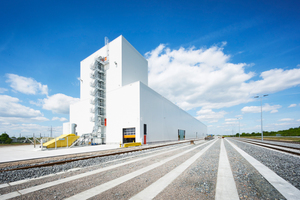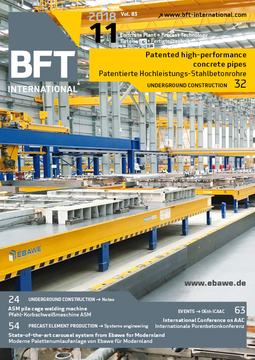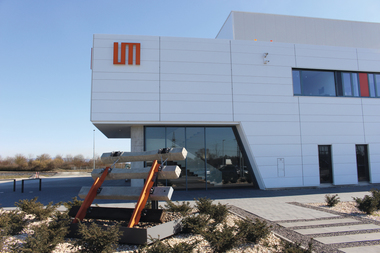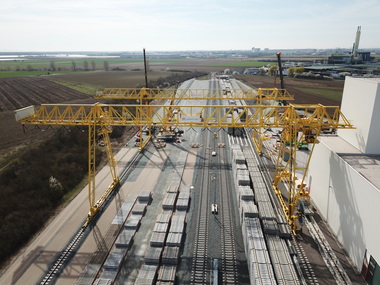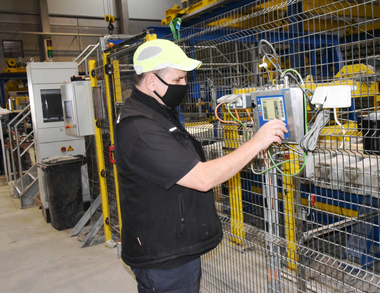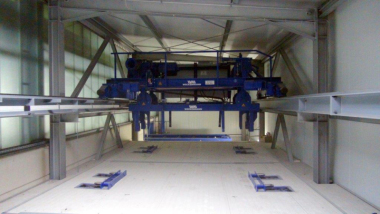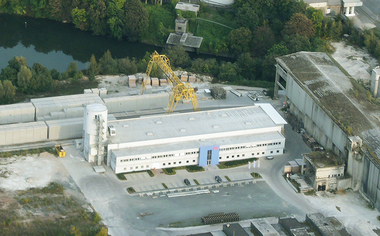Mixing technology for a new railway sleepers plant
Leonhard Moll Betonwerke GmbH & Co KG, from Munich, is a leading manufacturer of prestressed rail and switch sleepers for the rail network of the German Deutsche Bahn railway system and has a production capacity in Germany of over one million tons of prestressed concrete sleepers each year. Eirich mixing technology is already in use at a number of sites. Now a complete new production plant at the Biebesheim site has been built, for which Leonhard Moll once again chose mixing technology from Eirich.
The purpose of sleepers is to support the rails and to transfer the pressure of the axle loads to the substructure via the foundations. Originally made of timber or steel, since the middle of the last century they have been replaced by sleepers made of reinforced concrete instead. Some of the reasons for this were: The fact that the much higher weight provides a firmer and more stable track position, resulting in reduced maintenance costs. The rolling resistance of the trains is lower, track buckling due to thermal stress is reduced and the there is less running noise than with timber or steel sleepers.
The replacement of old sleepers as well as the construction of new lines and overhaul of existing ones means that there is a constant demand for new concrete sleepers. These sleepers have to comply with strict requirements in terms of quality. As a consequence, the concrete which is used requires optimum preparation.
Further development of the ring-trough and planetary mixer
The new production plant uses the early stripping process, meaning that it uses relatively dry mixes. Conventional mixing systems are mostly inadequate to cope with this. When it comes to slightly damp and dry concrete in particular, the strengths of Eirich mixing technology really come into their own. As a further development of the ring-trough and planetary mixer, the design of the system makes it possible to achieve higher tool speeds which means that a maximum of shear forces can be introduced into the mix. This achieves a better distribution of cement and moisture and more homogeneous fresh concrete. In turn, this ensures that the concrete is very uniform when inserted into the mould, with greater stability in stripping immediately afterwards.
The order placed with Eirich was for a complete mixing system with flat feeder and twin-belt elevators, raw material silos for six aggregates and three types of cement, steel structure for two independent mixing lines with Eirich type RV19 intensive mixers with a capacity of 1,500 liters and an Eirich machine control system. With the exception of the infeed, the entire system was integrated in the customer-provided production building and is “invisible” from the outside. Due to problematic groundwater conditions, the system concept involves no deep foundations, i.e. there was no need for a hopper pit.
Excellent working relationship
Both partners have emphasized that the working relationship was excellent before and during the construction phase. “What was important for us in terms of the choice of supplier for the mixing system were, along with compliance with the requirements with respect to the quality of the concrete, naturally the short mixing times made possible by these high-performance mixers, but also the working relationship with a partner with which we have already had nothing but positive experience,” says Pierre Paulin, Technical Director at Leonhard Moll. This is added to by Uwe Schnitzler, Head of Mechanical Engineering at Eirich: “What was particularly agreeable was the pragmatic solution-oriented teamwork at project manager level, which ultimately led to the punctual commissioning and hand-over of the system to Leonhard Moll.”
At the new Biebesheim plant Leonhard Moll will be able to produce up to 400,000 sleepers a year in the first phase of construction. Production started in autumn 2017 and has been running highly satisfactorily since then.

